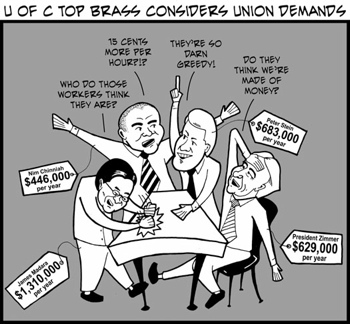


 |  |
 |
|
|
2007 Contract Campaign
Chronology
Workers became increasingly active in these discussions and self-education efforts. They started to develop a more formal, structured process of lunchbreak meetings to get information about the contract negotiations to rank and file workers; to further the discussion of demands for the new contract; and, finally, to start plan actions and strategies to pressure the University into conceding a decent contract. Workers asked SOUL to help find space to hold these meetings and also requested that students start talking to workers they knew and making sure that the workers were informed about the crucial issues and risks involved in the current contract negotiations.
As workers and students continued their efforts in mobilizing and organizing, increasing numbers of people began attending the lunchbreak meetings-workers were educated, organized and decided to take action. They began fliering, planning a button day, and organizing a rally to bring public attention to the contract fight.
This worker mobilization forced action from the University. On Wednesday, September 19th, the University finally made workers a contract offer. The contract included a 2% raise for the first six months, a 2% raise for the second six months, a 3% raise the second year, and a 3% raise the third year. This was below the 4% annual raise workers had been calling for. The university told workers that they had two days to accept the offer and if they did not then the offer would be rescinded.
Workers voted on the contract throughout the day on Friday, September 21st. In the end, they voted by a margin of 533-47 to reject the contract offer.
This vote was followed a week later by a major rally of workers and students supporters organized by SOUL. About 200 people marched in front of the administration building calling for a fair contract for campus workers.
Building on their recent success, workers set their next rally for Halloween. Again, the University's hand was forced and a better contract was offered, raising the offer to an average of 3.5% over the 3 year deal. On Tuesday, October 30th, workers voted to reject the administration's most recent contract offer by a margin of 312-228.
Despite the university's initial refusal to make a better offer than the prior two voted down ones, the workers remained united and failed to back down. Workers and student supporters continued to mobilize throughout November, rallying on Fridays, and even taking demonstrations downtown to the University's Gleacher center where ralliers joined from area schools and organizations. Finally, on Tuesday December 18th, the University offered workers a new contract. On Friday the 21st, workers voted in favor of the new contract which was an improvement on the previous offers made by the university. The university was intimidated by the solidarity of the workers and their persistant show of it through rallies and student-aided actions. Though the workers have gained a clear victory in this nearly-year long stuggle, they were not granted the 4% they deserve to cover the raising cost of living. The current contract will expire in 2009. With that time in mind, the reinvigorated union organizers and members will take the next step in their efforts and achieve more respect and a wage increase that truly reflects the rising cost of living.
Contract Wage Increase Details:
The Coalition: A complete list of allies and actions!
2007 Campaign picture and video gallery
2. Real job security.
3. The return of "step increases," which gave workers a raise that
In the News
As clerical workers realized that the University was gearing up to launch this concerted attack on basic working and wage standards on campus, the workers started get informed about the contract and about the negotiations. They then started discussing with co-workers, whether close friends, colleagues, or even strangers, to form an idea of what workers collectively wanted and needed to win during the contract fight.
Clerical Workers
Service and Maintenance Workers

Campaign flier, 2007
The Demands
1. A cost of living raise of at least 4%. A cost of living increase is
meant to keep wages in line with rising cost of living in this area.
Traditionally, the contracts that the University of Chicago has offered
its workers have had cost of living increases that met or exceeded inflation.
However, during these negotiations, the university has refused to offer
a greater than 3% wage increase.
reflected their years of experience, skills, and commitment to the university.
A step increase was a secondary raise that was supposed to do slightly
more than keep up with inflation. The principle behind step increases is that
when workers consistently show their dedication to working at the
University over a long period of time, there is a possibility of making a
decent, stable wage to support the worker and her/his family.
 Workers rally at negotiations, October 2007
Workers rally at negotiations, October 2007